June 21, 2025 | 02:46 GMT +7
June 21, 2025 | 02:46 GMT +7
Hotline: 0913.378.918
June 21, 2025 | 02:46 GMT +7
Hotline: 0913.378.918
LTS: In addition to numerous environmental, human health, and economic benefits, organic agriculture is emerging as a sustainable solution for expanding agricultural exports to major, high-value markets. As a contributor to this trend, Yen Bai province is effectively implementing the "four-household linkage" to develop organic cinnamon raw material area.
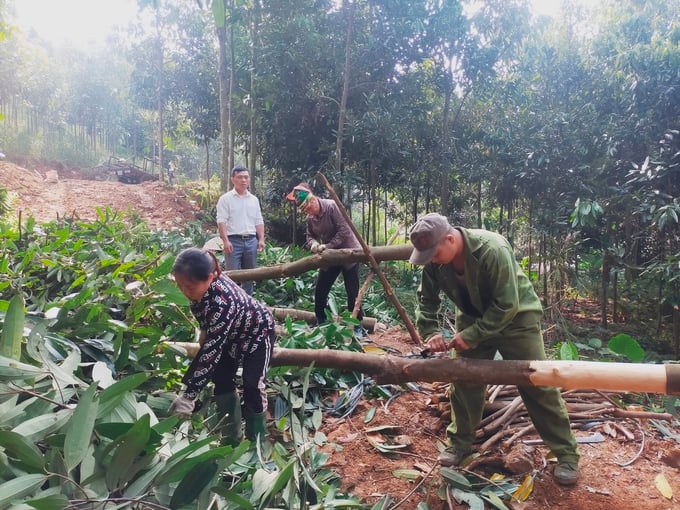
Residents of Dao Thinh commune, Tran Yen district, harvesting cinnamon bark. Photo: Thanh Tien.
For the last twenty years, Mr. Pham Van Hieu's family in Dao Thinh commune, Tran Yen district, Yen Bai province, has been dedicated to the cultivation of cinnamon trees. The family initially grew cinnamon using seeds and inorganic fertilizers, and applied chemical pesticides to control pests and diseases. After 2017, Mr. Hieu's family and other households in the village received technical guidance on organic cinnamon production from experts at Vietnam Cinnamon - Star Anise Cooperative and agricultural extension officers.
According to Mr. Hieu, his family and other households in the village previously had the habit of spraying herbicides to reduce labor costs. However, organic cinnamon production requires farmers to utilize agricultural by-products in combination with microbial agents as fertilizers, and use vegetative cover to retain moisture and enhance soil fertility.
Farmers must employ manual labor or machineries to perform weeding on cinnamon hills without using herbicides. This practice helps to preserve the local environment and water sources, maintain moisture, increase organic nutrients in the soil and protect the health of the local community. Additionally, organic cinnamon production significantly improves the quality of the final products. Notably, the cost of certified organic cinnamon is six to ten percent higher than that of non-certified organic products.
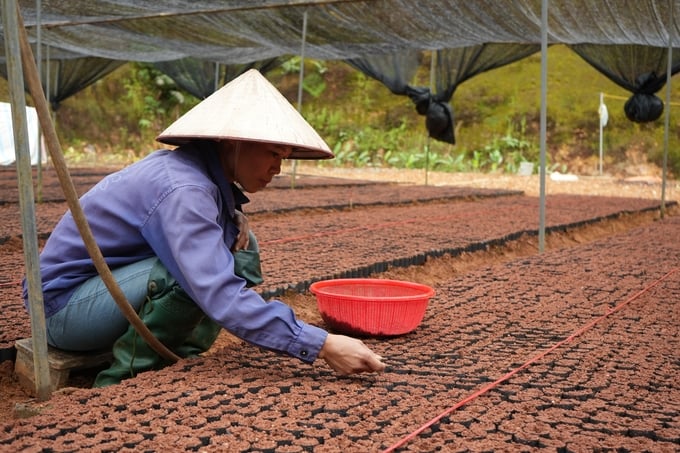
Selection of high-quality cinnamon seeds with verified origin is crucial to obtaining quality seedlings. Photo: Thanh Tien.
Dao Thinh commune currently houses nearly 900 hectares of cinnamon production area, the majority of which are located in villages with spacious hillside forest land. Approximately ten years ago, local residents primarily engaged in spontaneous cinnamon production with a reliance on habitual practices as opposed to learning about digging holes, tree spacing, fertilization timing, leaf pruning, etc. Moreover, traditionally produced cinnamon was grown from seeds, with farmers relying on personal experience to select seeds and estimate the amount of chemical fertilization and pesticides. As a result, their cinnamon products were unable to meet demanding markets. Ultimately, local farmers gradually lost interest when their products failed to generate profit and their output became unstable.
According to Mr. Pham Van Tien, Chairman of the Farmers' Association of Dao Thinh commune, due to a lack of understanding of organic farming, local farmers previously focused on productivity, output, and shortening harvest time. Following training sessions and technical guidance provided by relevant agencies and businesses, farmers gradually gained a better understanding of organic cinnamon production and its associated benefits.
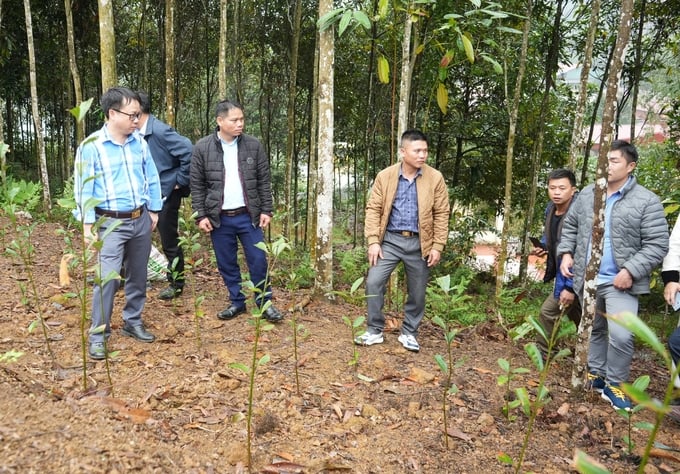
Residents of Dao Thinh commune regularly receive training on the techniques of organic cinnamon production. Photo: Thanh Tien.
The organic cinnamon production movement has been enthusiastically received by the residents of Dao Thinh commune within the last few years. To date, over 600 households in the commune have adopted organic cinnamon production. The numerous benefits associated with this production method has encouraged active community participation. As a result of the favorable local climatic conditions and soil fertility, cinnamon trees develop strongly without the use of chemical fertilizers. Alternatively, local households utilize organic manure and agricultural by-products to supplement the soil. The absence of chemical fertilizers, pesticides, and herbicides helps protect the environment as well as reduce investment costs.
Furthermore, the Vietnam Cinnamon - Star Anise Cooperative pays six to ten percent more than average for all of the local farmers' yield. At the end of each year, farmers selling products to the processing factory receive a bonus of 1.5 million Vietnamese dong per ton of standard-compliant products. Moreover, households in the organic cinnamon production area also receive financial support to build public welfare facilities such as roads, and aid is provided to poor households.
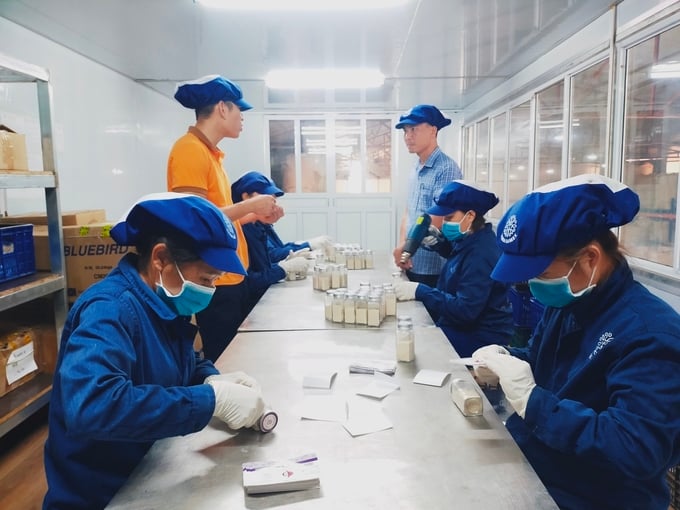
Workers at the Vietnam Cinnamon - Star Anise Cooperative's processing facility in Dao Thinh commune packaging products for export. Photo: Thanh Tien.
Cinnamon is organically produced in Dao Thinh commune using a non-toxic process that prioritizes the balance of natural ecosystems. Consequently, this production model significantly enhances the value of local cinnamon products, thereby opening up significant opportunities for promoting trade, boosting exports, and increasing income for local farmers.
To adress challenges within the organic cinnamon production process, Dao Thinh commune collaborated with local governments and businesses to organize training courses and provide technical guidance. Furthermore, the commune’s government monitors the local production process in the raw material area; and regularly collects samples to promptly detect quality deviations.
The Vietnam Cinnamon - Star Anise Cooperative has invested in building a processing factory for cinnamon products in Dao Thinh commune since 2017, with a total investment capital of over 80 billion Vietnamese dong. Equipped with modern production lines, the factory specializes in producing and processing between 1,500 and 2,000 tons of cinnamon products per year. The cooperative has made significant progress in developing cinnamon production towards meeting organic standards, forming value chains, expanding export opportunities, and bringing high economic efficiency to local farmers.
With the aim of establishing a closed production chain, the cooperative has collaborated with local governments to mobilize and guide the transition from traditional cinnamon production practices to organic cinnamon production. To date, the cooperative has signed production and offtake contracts with over 600 households in the commune and neighboring areas, with over 600 hectares of certified organic production area.
Moreover, the cooperative has established an organic cinnamon production line in compliance with international standards, with a focus on raw material quality and modern processing technology. As a result, the cooperative has exported its products to various high-end markets worldwide, including the United States, Japan, South Korea, and France.
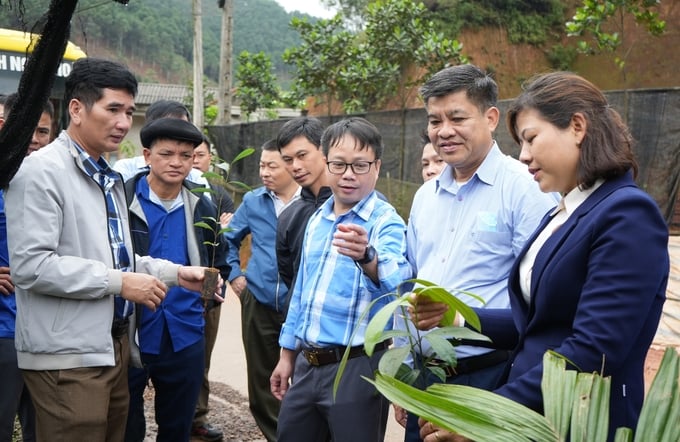
The organic cinnamon production movement is growing in popularity among villages within the planned cinnamon development area in Tran Yen district. Photo: Thanh Tien.
Mr. Nguyen Ba Mao, a representative of the Vietnam Cinnamon - Star Anise Cooperative in Yen Bai province, shared: "Within the last few years, the cooperative has collaborated with local governments to arrange training courses, and provide farmers with advice on how to grow and take care of cinnamon trees in accordance with international organic standards. Every year, the cooperative establishes teams to conduct cross-examinations in contracted raw material areas. In addition, officers are assigned to support and assist local farmers with seed selection, care and harvesting techniques, and offtake contract signing."
The cooperative currently manages nearly 1,000 hectares of organic cinnamon production area, with the participation of over 800 farmers from Dao Thinh and the neighboring communes of Tan Dong, Viet Thanh, and Hoa Cuong.
Furthermore, the cooperative provides regular employment for over 100 workers with monthly incomes ranging from 7 to 9 million Vietnamese dong. The cooperative has an average annual revenue of approximately 30 billion Vietnamese dong, with offtake contracts for farmers in Dao Thinh and its neighboring communes. Organic cinnamon production provides the factory with an excellent opportunity to continue expanding its target export market range.
The organic cinnamon production movement has been implemented by numerous households in Tran Yen district. The district currently houses over 20,000 hectares of cinnamon production area, including over 12,000 hectares of organic production area. Notably, over 3,000 hectares of the latter have received international organic certification.
The district's government will encourage local businesses and cooperatives to register and participate in the development of the organic cinnamon value chain. Additionally, the district will promote business's investment in sustainable production, deep processing, and consumption of cinnamon products to enhance product quality and value.
Translated by Nguyen Hai Long
![Turning wind and rain into action: [9] Digitizing hydrometeorological data in response to climate change](https://t.ex-cdn.com/nongnghiepmoitruong.vn/608w/files/news/2025/06/17/z6704423696987_15fd32ffc26d590d204d520c9dac6786-nongnghiep-165943.jpg)
(VAN) Farmers have begun accessing hydrometeorological applications to adjust their cropping schedules, aiming to ensure productivity and adapt to climate change.
![Turning wind and rain into action: [8] Real-time salinity detection and early warning technology](https://t.ex-cdn.com/nongnghiepmoitruong.vn/608w/files/news/2025/06/17/z6704423696987_15fd32ffc26d590d204d520c9dac6786-nongnghiep-151127.jpg)
(VAN) Thanks to the integration of modern hydrological-hydraulic models, remote sensing technologies, and artificial intelligence, the accuracy of hydrological forecasting has significantly improved.
![Turning wind and rain into action: [7] Early disaster warnings help marine farmers minimize losses](https://t.ex-cdn.com/nongnghiepmoitruong.vn/608w/files/news/2025/06/17/z6704423696987_15fd32ffc26d590d204d520c9dac6786-nongnghiep-142942.jpg)
(VAN) In recent years, thanks to early disaster warnings and forecasting, marine farmers in Khanh Hoa province have been able to reduce risks and losses, thereby improving production efficiency.
![Turning wind and rain into action: [6] ‘Four on-the-spot’ disaster management software](https://t.ex-cdn.com/nongnghiepmoitruong.vn/608w/files/news/2025/06/17/e5a48259d6a262fc3bb3-nongnghiep-183800.jpg)
(VAN) By simply activating the scenario on the disaster management software, the relevant authorities immediately know how many households need to be evacuated, where to evacuate them to, and by what means of transportation…
![Turning wind and rain into action: [5] Hue applies modern technology in disaster forecasting](https://t.ex-cdn.com/nongnghiepmoitruong.vn/608w/files/news/2025/06/17/z6704423696987_15fd32ffc26d590d204d520c9dac6786-nongnghiep-093938.jpg)
(VAN) In Hue city, modern technology has recently been applied in meteorological and hydrological forecasting and warning, helping to reduce the damage caused by natural disasters.

(VAN) A cutting-edge farming technique being implemented on an experimental ranch in Arizona's Sonoran Desert has already saved a billion gallons of water over five years, according to Civil Eats.

(VAN) Poultry and pig production and the environment can be boosted through enhanced water technology, according to new research.